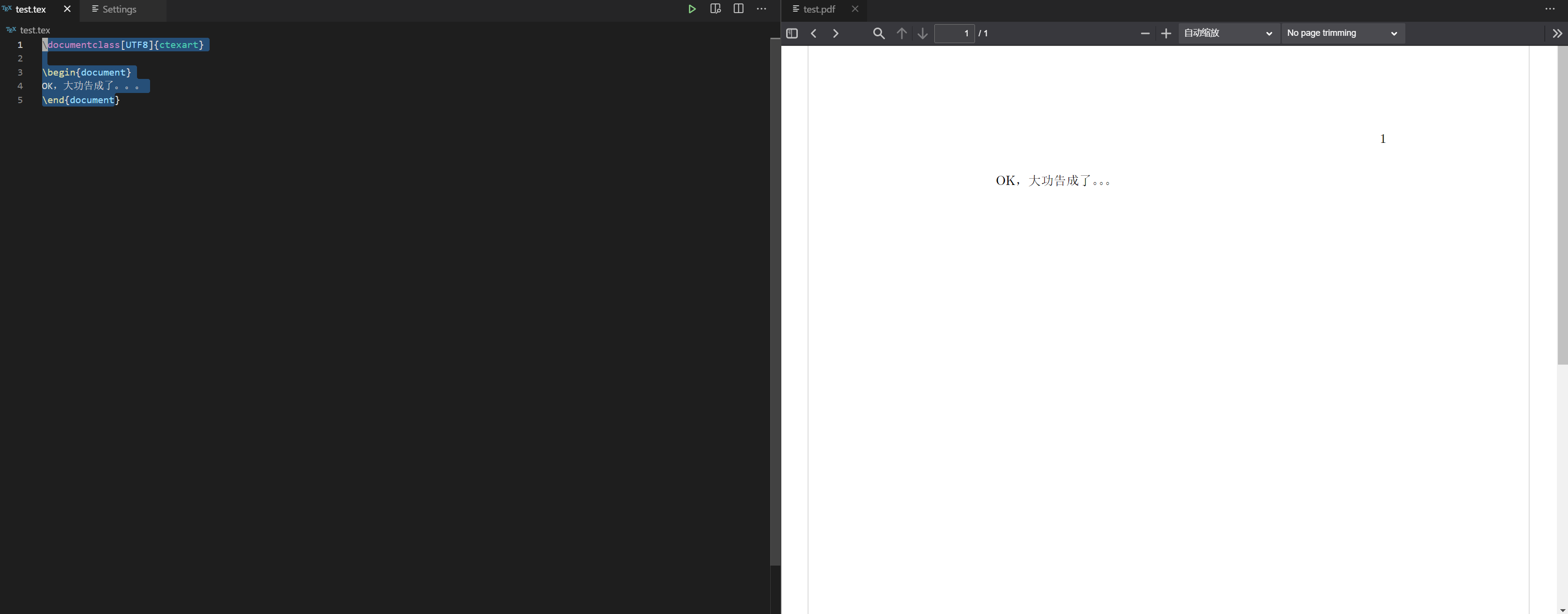如何在 Windows 上配置中文 Latex 环境
背景
本来没觉得这是值得写下来的事情,因为,CTex 之前大家用得很顺畅,没想到 CTex 已经从 2016 年后就没更新过了。于是,想找一下当下 2021 年的一个 Windows 上的中文 Latex 替代方案。
配置方法
- 安装 MiKTeX(TexLive 应该也一样),MiKTeX 可以自动下载依赖包,主动安装 ctex 包也可以。
- 安装 VSCode Latex 插件。
- 配置 Latex 插件。在知乎找到一份插件配置,很强大,不过也比较复杂。这里稍微简化了一下。
稍微解释一下,这里核心的部分其实就是 recipes 和 tools。tools 是编译工具链,包括使用哪种工具编译,选项用什么,顺序无所谓。recipes 是定义如何组合上述工具来生成最终文档,顺序是有意义的,默认使用第一个。 这里把 XeLaTex 放在了第一,也是因为它编译中文是兼容性最好的,如果用 pdflatex 来编译中文文件,大概率会踩坑。
{
"latex-workshop.latex.recipes": [
{
"name": "XeLaTeX",
"tools": [
"xelatex"
]
},
{
"name": "latexmk 🔃",
"tools": [
"latexmk"
]
},
{
"name": "latexmk (latexmkrc)",
"tools": [
"latexmk_rconly"
]
},
{
"name": "latexmk (lualatex)",
"tools": [
"lualatexmk"
]
},
{
"name": "pdflatex ➞ bibtex ➞ pdflatex × 2",
"tools": [
"pdflatex",
"bibtex",
"pdflatex",
"pdflatex"
]
},
{
"name": "Compile Rnw files",
"tools": [
"rnw2tex",
"latexmk"
]
},
{
"name": "Compile Jnw files",
"tools": [
"jnw2tex",
"latexmk"
]
},
{
"name": "tectonic",
"tools": [
"tectonic"
]
}
],
"latex-workshop.latex.tools": [
{
"name": "xelatex",
"command": "xelatex",
"args": [
"-synctex=1",
"-interaction=nonstopmode",
"-file-line-error",
"%DOCFILE%"
]
},
{
"name": "latexmk",
"command": "latexmk",
"args": [
"-synctex=1",
"-interaction=nonstopmode",
"-file-line-error",
"-pdf",
"-outdir=%OUTDIR%",
"%DOC%"
],
"env": {}
},
{
"name": "lualatexmk",
"command": "latexmk",
"args": [
"-synctex=1",
"-interaction=nonstopmode",
"-file-line-error",
"-lualatex",
"-outdir=%OUTDIR%",
"%DOC%"
],
"env": {}
},
{
"name": "latexmk_rconly",
"command": "latexmk",
"args": [
"%DOC%"
],
"env": {}
},
{
"name": "pdflatex",
"command": "pdflatex",
"args": [
"-synctex=1",
"-interaction=nonstopmode",
"-file-line-error",
"%DOC%"
],
"env": {}
},
{
"name": "bibtex",
"command": "bibtex",
"args": [
"%DOCFILE%"
],
"env": {}
},
{
"name": "rnw2tex",
"command": "Rscript",
"args": [
"-e",
"knitr::opts_knit$set(concordance = TRUE); knitr::knit('%DOCFILE_EXT%')"
],
"env": {}
},
{
"name": "jnw2tex",
"command": "julia",
"args": [
"-e",
"using Weave; weave(\"%DOC_EXT%\", doctype=\"tex\")"
],
"env": {}
},
{
"name": "jnw2texmintex",
"command": "julia",
"args": [
"-e",
"using Weave; weave(\"%DOC_EXT%\", doctype=\"texminted\")"
],
"env": {}
},
{
"name": "tectonic",
"command": "tectonic",
"args": [
"--synctex",
"--keep-logs",
"%DOC%.tex"
],
"env": {}
}
],
"latex-workshop.view.pdf.viewer": "tab"
}
- 创建一个文件夹
- 使用 VSCode 打开这个文件夹创建一个 .tex 文件,内容写
\documentclass[UTF8]{ctexart}
\begin{document}
OK,大功告成了。。。
\end{document
应该会自动开始编译,中间遇到需要下载依赖确认通过就好。编译后效果如下:
